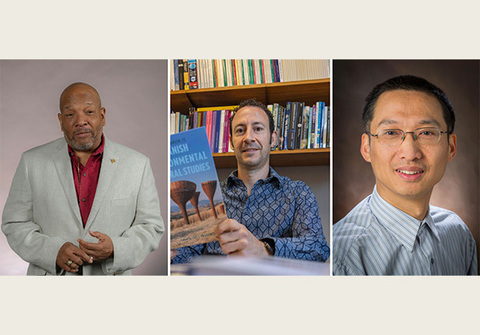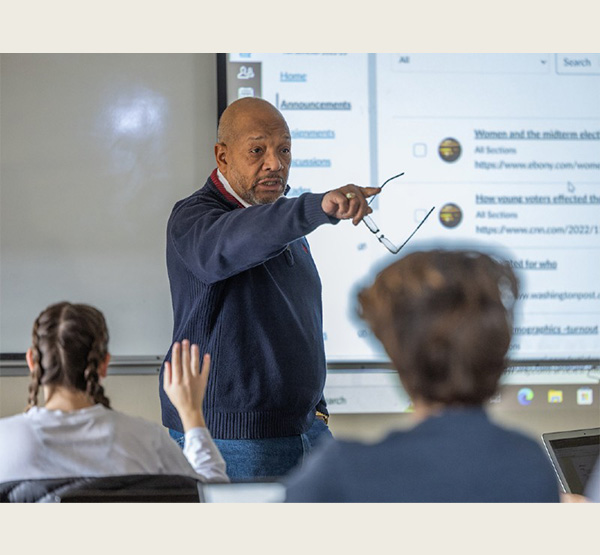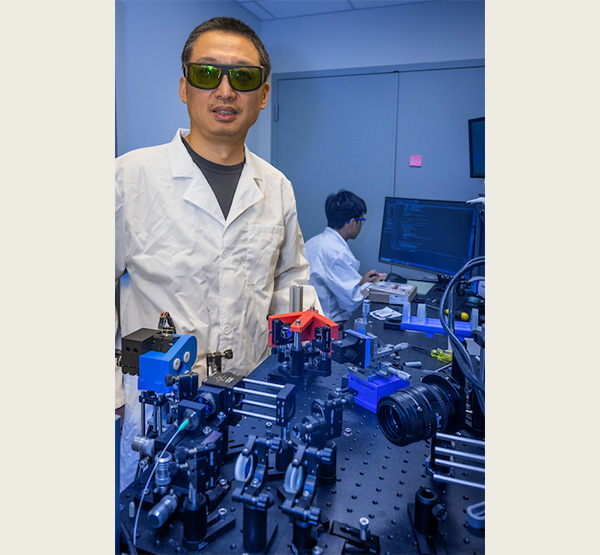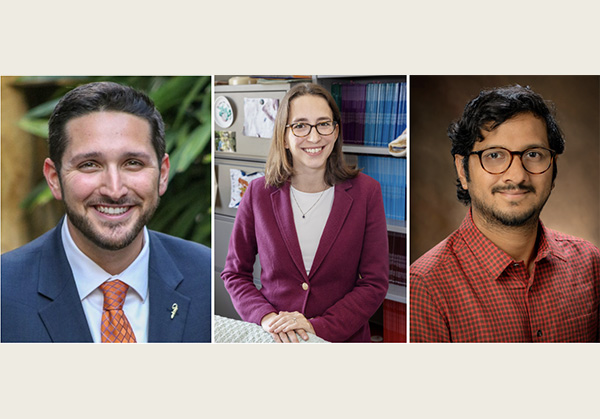Coates, Pradanos-Garcia, and Wang receive University Faculty Scholar Awards
The Faculty Scholars were honored in recognition of sustained excellence in research

Coates, Pradanos-Garcia, and Wang receive University Faculty Scholar Awards
Miami University Faculty Scholar Awards for 2025 have been presented to Rodney Coates, professor of Global and Intercultural Studies; Luis (Iñaki) Prádanos-Garcia, chair and professor of Spanish and Portuguese; and Hui Wang, associate professor of Chemical, Paper, and Biomedical Engineering.
University Faculty Scholar Awards honor faculty whose sustained excellence in research or other creative activity has brought them prominence in their fields.
Miami University Junior Faculty Scholar Awards for 2025 have been presented to Phillip Arceneaux, Allison Farrell, and Indivar Jonnalagadda. Read the story.

Rodney Coates
Coates, professor of Global and Intercultural Studies, is a public sociologist engaged in critical race, social justice, social movements, social policy, and practice.
He “personifies all that is excellent and important about being a scholar activist,” an external nominator wrote.
Coates has conducted bias training for school districts and municipalities, police, and universities. He has worked with local communities, corporations, and Miami University to establish pathways to progress for under-represented students in such fields as STEM, business, and law.
At Miami, he was the driving force for the creation of the Miami-Cincinnati Scholars program, which provides full scholarships for underrepresented students going into STEM.
Coates has “pioneered effective pedagogy creating programs that prepared young Black students for critical learning,” a nominator said. “His program with athletes at Miami University, for example, is a model for how to prepare them for the rigors of a university education.”
Coates joined Miami in 1990 as an assistant professor in the Department of Gerontology and Sociology. Since 2015, he has been a professor in the Department of Global and Intercultural Studies and served as director of Black World Studies from 2011 to 2016 and coordinator of that program since.
“His recent publications of monographs and edited volumes tackles the importance of critical race theory at a time when our society seems to shy away from an in-depth inquiry into how the past 250 years created the conditions facing minorities in this country,” a nominator wrote.
Most recently, his “Critical Race and the Search for Truth” (Bristol University Press, 2024) is garnering well-deserved praise. Coates is frequently featured in the national and local press, including the New York Times, MSNBC, CBS, and NPR, and he is a prolific contributor to The Conversation.
Coates was awarded the President’s Medal by Miami President Gregory Crawford in 2021 for his “extraordinary service” to Miami University. He also was the recipient of the MAC Outstanding Faculty Award for Student Success in 2021.
“Rodney has been a mentor and intellectual guide to many. His involvement in Critical
Sociology as a member of the editorial board and a frequent reviewer demonstrates the same care and support one can find in his teaching,” a nominator wrote.
Coates has a record of scholarship that spans three decades and includes numerous published peer-reviewed articles, books, book chapters, and collections. His books have won awards and charted new territory.

Luis (Iñaki) Prádanos-Garcia
Prádanos-Garcia is known for his internationally recognized research, a pioneering and integrative approach to environmental justice.
“Although Iñaki’s work spans multiple fields and subfields, I tend to view his research under the umbrella of environmental justice, a field that examines the drivers and unequal impacts of environmental harm as well as strategies for achieving a more ecologically sustainable and socially just future,” a nominator wrote.
Prádanos-Garcia joined Miami in 2013 and also is affiliated with the Institute for the Environment and Sustainability. He was a 2023-2024 Altman Scholar of Environmental Justice.
An external nominator who has worked closely with him wrote that Prádanos-Garcia is widely regarded as a foundational and distinguished figure in the growing field of Spanish socio-environmental cultural studies. “He has opened many promising doors for intellectual inquiry, established productive links between the humanities and the social and environmental sciences, and brought theoretical research, pedagogy, and environmental activism closer together in mutually enriching ways.”
Prádanos-Garcia’s interdisciplinary work has appeared in top journals in the environmental humanities and cultural studies.
“Perhaps most important for this award is his internationally-influential and innovative work in post-growth economics, which charts a novel path for overdeveloped countries to begin to effectively and justly address the ecological crisis, focusing on cultural changes and strategies for achieving this aim,” the nominator wrote.
Of his many contributions to this area is his well-received monograph “Postgrowth Imaginaries: New Ecologies and Counterhegemonic Culture in Post-2008 Spain” (Liverpool University Press, 2018).
The originality, rigor, and relevance of his work are also evident in his current research project, provisionally entitled Postgrowth Humanities.
“Anyone who knows Iñaki knows that he does not see his research and teaching as distinct silos, but, instead, as intertwined pathways for fostering a culture conducive to environmental justice,” a nominator wrote. “This enthusiasm is clear in his publications and conference presentations, where he frequently publishes and gives talks on pedagogy. In short, Iñaki is an exemplar of Miami’s teacher-scholar model."

Hui Wang
Wang conducts research in the areas of optical imaging, laser tissue interaction, imaging guided surgery, optical sensing, and imaging processing with artificial intelligence.
He leads the Biomedical Optical Imaging and Sensing Lab, dedicated to developing technologies that can pave the way for the next generation of optical coherence tomography (OCT) in clinical practice. He collaborates with biologists to bring OCT to the realm of small animal imaging, addressing fundamental questions in basic science research.
“Supported by prestigious R21 and R01 grants, Dr. Wang’s team collaborates with biologists to apply this advanced technology in studying lens and retina regeneration in newts and zebrafish, contributing significantly to our understanding of regenerative biology,” a nominator wrote.
Prior to joining Miami in 2016, Wang spent four years working in the medical device industry.
“Dr. Wang's achievements reflect not only an outstanding ability to conduct high-level research but also to improve human health through innovation and practical application,” a nominator wrote.
Wang’s groundbreaking area of research involving the application of optical principles — specifically coherence tomography — for the detection of interstitial cystitis (also known as bladder pain syndrome) is supported by a grant from the Department of Defense (DOD). His team has developed an innovative method to track urothelial cell distribution in the bladder through intracellular motion analysis.
“This innovative diagnostic approach is being integrated with laser-based smart surgery techniques, allowing simultaneous visualization and treatment of recurrent bladder tumors in a single procedure,” a nominator wrote.
By working closely with urologists, Wang ensures that these technological advancements are translated into practical clinical applications that address pressing medical challenges.
Wang has secured competitive research funding, serving as principal investigator on grants totaling $1.5 million from agencies, including the National Institutes of Health, DOD, and private organizations, while also contributing as a co-investigator on grants totaling an additional $2.3 million.
His research findings have been published in 27 peer-reviewed journals, with a significant number stemming from his work at Miami University. A nominator wrote, “His scholarly impact extends to numerous conference proceedings, four patents, and an additional pending patent, further solidifying his contributions to the field.”
Wang has built strong collaborations with researchers worldwide. “His significant contributions extend to the mentorship of undergraduate and graduate students, where he fosters a collaborative and innovative research environment,” a nominator wrote.
A recent grant helps fund development of the next-generation OCT technology capable of performing in vivo retinal imaging at cellular resolution, a nominator wrote. “This initiative aims to establish OCT as a globally accessible screening tool, akin to blood testing, for the early detection and monitoring of retinal and systemic diseases.”
